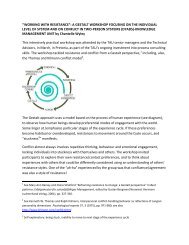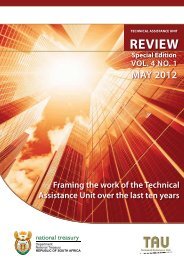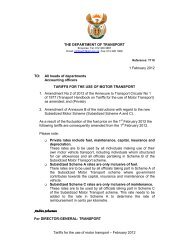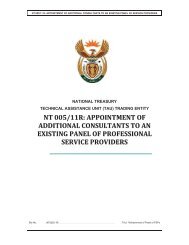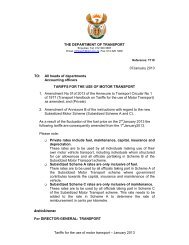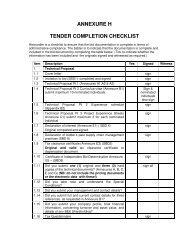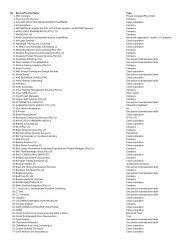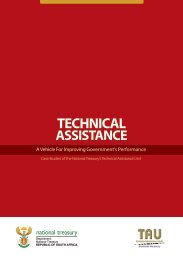Review 3 final 2 - TAU - National Treasury
Review 3 final 2 - TAU - National Treasury
Review 3 final 2 - TAU - National Treasury
You also want an ePaper? Increase the reach of your titles
YUMPU automatically turns print PDFs into web optimized ePapers that Google loves.
TECHNICAL ASSISTANCE UNIT REVIEW | From “Kuvernan” to Cyber-Networks<br />
ity is the right to do so. Authority is therefore based<br />
on an acknowledged duty to obey rather than on any<br />
form of coercion or manipulation.<br />
In similar vein, Jackson and Jackson (1997:8), as quoted<br />
Ibid above, refer to the need for governance because<br />
… the conflict in society which flows from making political<br />
decisions for a country requires mechanisms to<br />
enforce those decisions. We refer to these mechanisms<br />
as government. Government is thus the organization<br />
of people for the resolution of dispute and conflict.<br />
Cheru (2002:35), cited by Venter and Neuland (2005),<br />
states that the term “governance”… which implies<br />
responsible, accountable transparent, legitimate, effective<br />
democratic government – is of recent origin<br />
in political science discourse. More appropriately, it<br />
has become used much more frequently in discussing<br />
how governments are to perform in undertaking<br />
public changes, innovations and processes that should<br />
bring about social, economic and political progress in<br />
Africa.”<br />
Understandings and Dimensions:<br />
from traditional… to networks…<br />
to cyber worlds…<br />
There are also various understandings of the term<br />
“governance”, with perhaps the following six being the<br />
most prominent dimensions: (1) the minimal state, (2)<br />
corporate governance, (3) the new public management;<br />
(4) or ‘good governance’, (5) socio-cybernetic<br />
systems and (6) self-organising and inter-organisational<br />
networks (Rhodes 1996: 652).<br />
Based on the above, and proximate to the ‘governance<br />
spaces’ that are being played out in 2011, starting with<br />
Tunisia and moving to many countries, north of our<br />
borders, this framing article intends to review governance<br />
through the lens of networks and governance<br />
with a specific focus on South Africa’s legal and networked<br />
frameworks for governance.<br />
In our current development context, and with the example<br />
of the “Egypt Moment” and others, society is increasingly<br />
being shaped by networks that cut across<br />
international, national and regional boundaries. Attendant<br />
to this, some might argue that there is the ‘hollowing<br />
out’ of the state and/or new public management<br />
regimes with intergovernmental management,<br />
which bring networks into increasing pervasiveness as<br />
a feature of modern governance forms (Rhodes 1996:<br />
652). Notwithstanding this, context determines the extent<br />
to which such networks, or, perhaps more clearly,<br />
inter-organisational self-organising forms of governance<br />
are located in society and state -and what the<br />
impact of this is on the role of government and service<br />
delivery.<br />
An interesting angle to the new developments/vocabulary<br />
above is that there is a need to rethink where<br />
governance is situated or placed. With the vast proliferation<br />
of information communication technologies<br />
(ICTs), individualization and globalization, nation states<br />
are finding themselves eroded of means of maintaining<br />
power outside the area of mainstream politics. However,<br />
many states still maintain power through various<br />
formal links with significant players in society. State institutions<br />
are now increasingly needing to make use of<br />
the new ‘network logic’; that society is increasingly an<br />
open and unstable structure that expands, readjusts,<br />
shifts and even evaporates and is therefore becoming<br />
more and more fluid (Hajer and Wagenaar 2003: 6).<br />
Governance in this particular instance is a function of<br />
the ‘fluid society’ and therefore processes towards governing<br />
are also shifting. 2011 has been a telling year<br />
in demonstration of the credibility of these assertions.<br />
4<br />
page<br />
Enabling change for development



